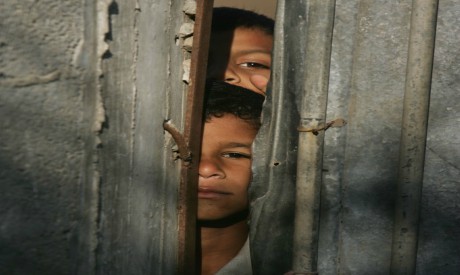
File Photo: Palestinian Bedouin boys from a marginal community outside Gaza City play as they look out of their courtyard gate (Photo: Getty images)
In history, as in the drama, climactic moments can creep up on us unforeseen.
In January a newcomer entered the White House. In the wake of Donald Trump’s election the world has become increasingly anxious about the stresses his unprecedented policy of brinkmanship is placing on the international order.
We have passed through more than one semi-apocalyptic moment and there are few signs 2018 will bring a change. There has been the North Korean saga, accompanied by an unseemly show of vitriolic mudslinging, the verbal war with Iran and, most recently, Trump’s declaration that the US would recognise Jerusalem as Israel’s capital and move its embassy there. All three episodes have left world capitals feeling jittery, and fearing more to come.
Not that the news was all bad. One positive development of the last 12 months was the defeat of Islamic State group (IS) in Iraq and the erosion of its presence in Libya and Syria. Yet the spurious ideology IS espouses remains a challenge in the febrile atmosphere that has engulfed the Arab and Islamic worlds.
The Middle East is deeply fragmented, and with many of the region’s major players seemingly determined to engage in a perilous game of brinkmanship the chances of pulling back from the edge are slim. Regional rivals are pursuing what they perceive as their own interests regardless of the costs to others.
The sorrows of the Middle East will not be alleviated — indeed, they are guaranteed to deepen — as long as the region remains a stage for patrons and clients who seek not a new order but chaos, stoking conflict and inviting plagues with their reckless policies.
*This article was first published in Al-Ahram Weekly
Short link: